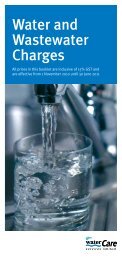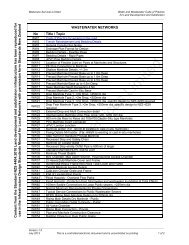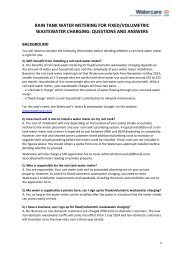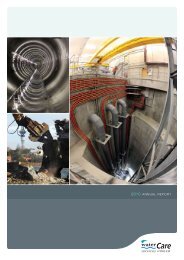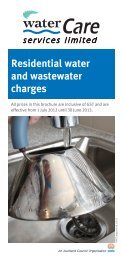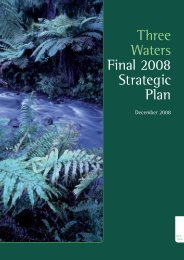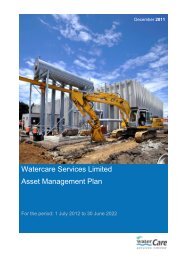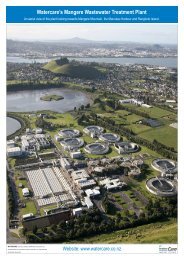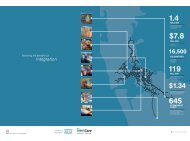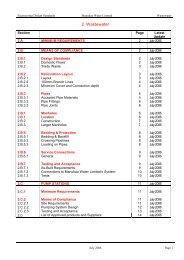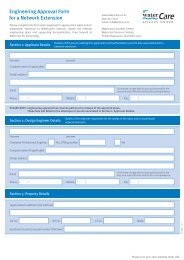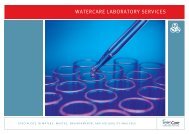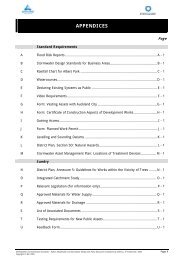Revised Trade Waste Bylaw - Watercare
Revised Trade Waste Bylaw - Watercare
Revised Trade Waste Bylaw - Watercare
- No tags were found...
Create successful ePaper yourself
Turn your PDF publications into a flip-book with our unique Google optimized e-Paper software.
Auckland<strong>Trade</strong> <strong>Waste</strong> <strong>Bylaw</strong>May 2013November 2012IMAGE TO BEINSERTEDPage 1
Last updated21 20 MayNovember 2012 2013 Auckland <strong>Trade</strong> <strong>Waste</strong> <strong>Bylaw</strong> 20143Auckland <strong>Trade</strong> <strong>Waste</strong> <strong>Bylaw</strong> 20134(as at 21 November 201220 May 2013)Te Ture a Rohe Waiparu a Mahi 20134Governing Body of Auckland CouncilResolution in Council[Insert date of resolution]Pursuant to the Local Government Act 2002 and Local Government (Auckland Council) Act 2009, theGoverning Body of Auckland Council makes the following bylaw.Page 2
Last updated21 20 MayNovember 2012 2013 Auckland <strong>Trade</strong> <strong>Waste</strong> <strong>Bylaw</strong> 20143SchedulesSchedule 1: Deemed trade waste ........................................................................................... 20Schedule 2: Conditional trade waste activities ..................................................................... 22Schedule 3: Prohibited trade waste........................................................................................ 23Controlled substances standards (for information only - not part of bylaw) ..................... 24Page 4
Last updated21 20 MayNovember 2012 2013 Auckland <strong>Trade</strong> <strong>Waste</strong> <strong>Bylaw</strong> 201431 Title(1) This bylaw is the Auckland <strong>Trade</strong> <strong>Waste</strong> <strong>Bylaw</strong> 20134.2 Commencement(1) This bylaw comes into force on 1 July 20134.3 Application(1) This bylaw applies to Auckland.4 Purpose(1) The purpose of this bylaw is to:Part 1Preliminary provisions(a)(b)(c)(d)(e)protect the health and safety of all people from potential adverse effects ofharmful substances discharged to the public wastewater system;protect the environment from adverse effects of harmful substances dischargedto the public wastewater system;protect the public wastewater system from damage and provide for its efficientoperation;assist treatment plants within the public wastewater system to processwastewater and produce biosolids of a guaranteed quality;encourage waste minimisation, cleaner production, efficient recycling and reuseof waste streams at business premises.5 Interpretation(1) In this bylaw, unless the context otherwise requires:Act means the Local Government Act 2002.approval or approved means approval or approved in writing by the council.approved site means a site approved for the safe disposal of trade waste.Auckland water organisation has the same meaning as in section 4 of the LocalGovernment (Auckland Council) Act 2009.biosolids means treated sewage sludge from a wastewater treatment plant that hasbeen treated and/or stabilised to the extent that it is able to be applied to land, anddoes not include products derived solely from industrial wastewater treatment plants.characteristic means any of the physical or chemical characteristics of trade wasteincluding any constituent of a trade waste referred to in schedule 1, schedule 2,schedule 3 or the controlled substances standards.conditional trade waste means:(a)any trade waste discharged to the public wastewater system as a result of anactivity listed in schedule 2 and complying with the controlled substancesstandards, unless otherwise approved by council in a trade waste agreement;orPage 5
Last updated21 20 MayNovember 2012 2013 Auckland <strong>Trade</strong> <strong>Waste</strong> <strong>Bylaw</strong> 20143(b)any trade waste discharged from trade premises, including as a result of anactivity the types of premises listed in schedule 1, where the volume of thedischarge exceeds 10four cubic metres per day or 1 litre per second; or(c)any trade waste which the council determines to be conditional trade wasteunder clause 7.connection means the lawful and physical connection of a private sewer to the publicwastewater system.consent holder means the holder of a transitional consent and includes any personacting with the express or implied consent of the consent holder and any licensee ofthe consent holdercontrolled substances standards means the generally accepted limits forconcentrations of controlled substances that may be contained in trade wastedischarged to the public wastewater system, as amended determined from time totime by council resolution.council means the Auckland Council, an Auckland water organisation, or any persondelegated or authorised to act on their behalf.deemed trade waste means any trade waste discharged into the public wastewatersystem as a result of an activity from a source listed in schedule 1 and which:(a)meets the requirements listed in schedule 1 and the controlled substancesstandards; and(b) does not have any of the prohibited characteristics listed in schedule 3.disconnect or disconnection means the physical cutting or sealing of a privatesewer from the public wastewater system.drain means that section of private pipe, owned and maintained by the occupier,between the occupier's premises and the point of discharge through which wastewateris conveyed from the premises to the public wastewater system.emergency response procedures means those procedures developed and used toavoid, remedy or mitigate the actual and/or potential adverse effects of any businessactivities on the environment from an unexpected or unscheduled event resulting indischarge, or potential discharge, with characteristics of concern into the publicwastewater system.grease trap means a device approved by the council that allows kitchen and/or foodproduction wastewater to cool, and the grease to separate from the wastewater.hazardous material means:(a)raw material(s), product(s) or waste(s) containing corrosive, toxic, biocidal,radioactive, flammable or explosive materials; or(a)(b) any material which when mixed with the wastewater stream, is likely togenerate toxic, flammable, explosive or corrosive materials in quantities likelyto be hazardous to the health and safety of any person or harmful to thewastewater system; or(c)contains hazardous substances at sufficient concentrations to exceed theminimum degrees of hazard specified by Hazardous Substances (MinimumDegrees of Hazard) Regulations 2000 under the Hazardous Substances andNew Organism Act 1996; orPage 6
Last updated21 20 MayNovember 2012 2013 Auckland <strong>Trade</strong> <strong>Waste</strong> <strong>Bylaw</strong> 20143(d)meets the definition for infectious substances included in the Land TransportRule: Dangerous Goods 1999 and NZ Standard 5433: 1999 – Transport ofDangerous Goods on Land; or(b)(e) meets the definition for radioactive material included in the Radiation ProtectionAct 1965 and Regulations 1982;introduce means to cause trade waste to enter a wastewater system or stormwatersystemlegacy bylaw means any of the following:(a) Auckland Regional Council <strong>Trade</strong> <strong>Waste</strong>s <strong>Bylaw</strong> 1991;(b) Franklin District Council <strong>Trade</strong> <strong>Waste</strong> <strong>Bylaw</strong> 2007;(c) Part 9 (<strong>Trade</strong> <strong>Waste</strong>) of the North Shore City <strong>Bylaw</strong> 2000;(d) Chapter 17 (<strong>Trade</strong> <strong>Waste</strong>) of the Rodney District Council General <strong>Bylaw</strong> 1998mandated pre-treatment means management of conditional trade waste through theinstallation of an approved ‘off the shelf’ pre-treatment device.mass limit means the total mass of any characteristic of trade waste that may bedischarged to the public wastewater system over any 24-hour period.meter means any meter, automatic sampler, instrument or device for indicating,recording or sampling the rate of flow, volume or quality of any discharge and anyancillary equipment, devices or fittings used in conjunction with these.occupier means the person occupying any trade premises or the person responsiblefor any trade, commercial or industrial activity on those trade premises, and includesthe owner of the premises if the premises are unoccupied.output based means management of conditional trade waste by customised pretreatmentfacilities or specialist monitoring requirements.owner means the person who owns the premises from which trade waste originatesor on which trade waste is located.person means a person or body of persons whether corporate or unincorporated, andincludes the Crown and any successor of a person.point of discharge means the boundary between the public wastewater system andprivate drain but for the purposes of monitoring, sampling and testing, may be analternative designated point as specified in a transitional consent.premises means either:(a)(b)(c)(d)a property or allotment which is held under separate certificate of title or forwhich a separate certificate of title may be issued and in respect of which abuilding consent has or may be issued; ora building that has been defined as an individual unit by a cross lease, unit titleor company lease and for which a certificate of title exists; oran individual unit in a building where units are separately leased; orland held in public ownership.pre-treatment means any approved processing of trade waste designed to reduce orvary any characteristic in a waste before discharge to the public wastewater system inorder to comply with a transitional consent or this bylaw.private sewer means any privately owned pipe or drain system through whichwastewater flows before entering into the public wastewater system.Page 7
Last updated21 20 MayNovember 2012 2013 Auckland <strong>Trade</strong> <strong>Waste</strong> <strong>Bylaw</strong> 20143prohibited characteristics means characteristics set out in schedule 3.prohibited trade waste means any trade waste that has, or is likely to have, any ofthe prohibited characteristics set out in schedule 3.public wastewater system means all pipes, pumping stations, storage tanks,wastewater treatment plants, sea outfalls and other related structures owned by orunder the control of the council, used for the receiving, transporting, treating ordisposing of wastewater.screen means a facility used to catch solids prior to the point of discharge.sewage sludge means the material settled out from wastewater during the treatmentprocess.sewer means all wastewater pipes, tunnels, manholes and inspection chambers,whether privately owned or part of the public wastewater system.Standard Methods for the Examination of Water and <strong>Waste</strong>water means the latestedition (including the Supplement) as published by the American Water WorksAssociation (AWWA) / American Public Health Association (APHA).stormwater means surface run-off water originating from precipitation events such asdrizzle, mist, rain, sleet, hail or snow.stormwater system means any inlets, pipes, channels, ponds, detention or treatmentsystems, outfalls and other related structures owned by or under the control of thecouncil, used for receiving, treating or disposing of stormwater.tankered waste means trade waste which is conveyed by vehicle from any premisesfor disposal at an approved site.temporary discharge means:(a)(b)(c)a discharge of trade waste for an intermittent or short duration; ora short-term discharge of a special or unusual trade waste by an occupierholding a transitional consent; ora discharge of tankered waste to a designated point in the public wastewatersystem.trade premises means:(a)(b)(c)(d)(e)any premises used or intended to be used for any business, industrial or tradepurpose; orany premises used or intended to be used for the storage, transfer, treatment,or disposal of waste materials or for other waste management purposes, orused for composting organic materials; orany other premises from which a contaminant is discharged in connection withany industrial or trade premises; orany other premises discharging sewage other than domestic sewage, andincludes any land or premises wholly or mainly used for agricultural orhorticultural purposes; ora tanker truck or any other vehicle capable of receiving, storing, transporting,and or discharging trade waste.trade waste means any liquid, with or without matter in suspension or solution, that isor may be discharged from trade premises to a wastewater system or stormwatersystem in the course of any business, industrial or trade process or operation, or in thecourse of any activity or operation of a like nature.trade waste agreement means an agreement under of the type described in clause2324(1).Page 8
Last updated21 20 MayNovember 2012 2013 Auckland <strong>Trade</strong> <strong>Waste</strong> <strong>Bylaw</strong> 20143trade waste management plan means an overall trade waste management plan fortrade premises.transitional consent means a consent or permit granted under a legacy bylaw and inforce immediately prior to the commencement of on the day this bylaw comes intoforce, authorising the discharge of trade waste into the public wastewater system.wastewater means water or other liquid waste, including sewage and waste matter insolution or suspension, discharged to the public wastewater system.(2) A reference in this bylaw to introducing or discharging trade waste includes causing,allowing or instructing the introduction or discharge of trade waste.(3) To avoid doubt, compliance with this bylaw does not remove the need to comply withall other applicable Acts, regulations, bylaws, and rules of law.(4) Unless the context requires another meaning, a term or expression that is defined inthe Act and used in this bylaw, but not defined, has the meaning given by the Act.(5) Any explanatory notes and attachments are for information purposes, do not form partof this bylaw, and may be made, amended and revoked without formality.(6) The Interpretation Act 1999 applies to this bylaw.6 Deemed trade wastePart 2Classification of <strong>Trade</strong> <strong>Waste</strong>(1) A person may discharge deemed trade waste into the public wastewater systemwithout a transitional consent or trade waste agreement.(2) Notwithstanding subclause (1) the council may:(a)(b)(c)require a person discharging deemed trade waste into the public wastewatersystem to pre-treat that trade waste to specific standards or requirements inorder to prevent the discharge damaging or otherwise adversely affecting thepublic wastewater system;in accordance with the Local Government Act 2002, enter premises in order todetermine the characteristics of the discharge to the public wastewater system,and to that end may inspect the premises and take samples of any discharge;advise the person of the need to enter into a trade waste agreement, where thecouncil reasonably believes that person is or will be discharging conditionaltrade waste.(3) Nothing in subclause (1) derogates from any agreement between the council and aperson in relation to water or wastewater services provided by the council.7 Conditional trade waste(1) The council may determine that any trade waste is conditional trade waste where:(a)(b)the pollutant load for any substance or volumetric discharge exceedsfive percent or other council-specified proportion of the total load or volumereceived at the council's treatment plant; orthe trade activity and processes are of such a complexity or size, or employsuch chemicals, raw materials, or feedstock, that the risks of producing a tradewaste which is not an acceptable discharge are considered significant by thecouncil; orPage 9
Last updated21 20 MayNovember 2012 2013 Auckland <strong>Trade</strong> <strong>Waste</strong> <strong>Bylaw</strong> 20143(c)the discharge contains substances that may at times exceed the controlledsubstances standards.(2) No person may discharge or introduce conditional trade waste into the publicwastewater system unless authorised to do so under a transitional consent or a tradewaste agreement.8 Prohibited trade waste(1) No person may discharge or introduce prohibited trade waste into the publicwastewater system.Part 3Controls on trade waste discharges9 Requirements for trade waste discharges(1) No person or occupier shall introduce or discharge any trade waste (other thandeemed trade waste) into the public wastewater system unless:(a)(b)(cb)it is deemed trade waste; orthey have a transitional consent or trade waste agreement that authorises theintroduction or discharge; andthey comply with the conditions set out in that transitional consent or tradewaste agreement.introduction or discharge complies with the conditions set outin that transitional consent or trade waste agreement.(2) No person or occupier shall introduce or discharge trade waste into the publicwastewater system except in accordance with this bylaw.(3) No person or occupier shall introduce or discharge any trade waste into thestormwater public wastewater system unless:(a)(b)they have a transitional consent or trade waste agreement that authorises theintroduction or discharge;the introduction or discharge complies with the conditions set out in thattransitional consent or trade waste agreement.(4) No person or occupier shall discharge any trade waste in a way that results or mayresult in it entering any land or water (whether freshwater, coastal water or stormwater)outside the premises. This prohibition does not apply to tankered waste disposed ofpursuant to a transitional consent or trade waste agreement.10 Hazardous materials(1) No person or occupier shall store, transport, handle or use, or cause or allow to bestored, transported, handled or used, any hazardous materials in a way which resultsor may result in :(a)(b)the materials entering the public wastewater system or stormwater system.; orthe materials entering any land or water (whether freshwater, coastal water orstormwater) outside the premises.(2) Any person who carries out the off-site disposal of any hazardous materials must keeprecords of such disposal and make such records available for inspection by thecouncil within four hours of a request to inspect by the council.Page 10
Last updated21 20 MayNovember 2012 2013 Auckland <strong>Trade</strong> <strong>Waste</strong> <strong>Bylaw</strong> 20143(3) An occupier shall inform the council immediately upon discovery of any trade wasteaccident, including spills or process mishaps, which may cause a breach of anytransitional consent or this bylaw.11 The council may require testing and maintenance of meters and other apparatus(1) If required by the council, the occupier shall provide testing and maintenance of:(a)(b)such meters as may be required to measure the volume and rate of dischargeof any trade waste being discharged into the public wastewater system;apparatus for determining the nature and composition of any trade waste beingdischarged into the public wastewater system.12 Dilution of trade waste(1) No person or occupier shall add or allow the addition of any water whatsoever to anytrade waste unless specific approval is given in a transitional consent or current tradewaste agreement, and such discharge is in accordance with any conditions set out inthat transitional consent or trade waste agreement.(2) No person or occupier shall add or allow the addition of stormwater to any wastewaterunless:(a)(b)(c)the area from which the stormwater originates is part of the trade premises andis included in any transitional consent and appropriate detention or treatmentdevices are in place and maintained in accordance with that consent; orprior written approval or a transitional consent has been granted by the council,and such discharge is in accordance with any conditions set out in that consent;orthe trade premises are within the council approved combined sewer systemcatchment area and there is no provision for separate stormwater drainage.Part 4 – Transitional consents13 Continuation of transitional consent(1) A transitional consent continues until it is surrendered or expires or is cancelled inaccordance with this bylaw.14 Application to vary transitional consent(1) Any person or occupier wishing to:(a)(b)vary the characteristics of a discharge authorised under a transitional consent;orvary the conditions of a transitional consent (other than the term of the consent);must apply to the council to do so.(2) Where the council requires additional information in relation to a variation applicationunder subclause (1), it may require any such information at the cost of the occupier.That information may include but is not limited to:Page 11
Last updated21 20 MayNovember 2012 2013 Auckland <strong>Trade</strong> <strong>Waste</strong> <strong>Bylaw</strong> 20143(a)(b)an independent audit by a suitably experienced and external person to verifyany or all information supplied by the occupier; and/orinvestigation and/or analysis of the trade waste discharge.(3) Where any trade premises has separate points of discharge from more than one area,any variation application must be accompanied by a separate description of the tradewaste to be discharged from each area. The council may require a separate variationapplication for each point of discharge.(4) The council may, at its discretion, deal with the owner of trade premises instead of theoccupier in relation to a variation application, and this bylaw shall apply to such anowner as if references to occupier were to owner.(5) The occupier shall ensure that a variation application, and every other documentconveying required information, is accurate and properly executed.(6) The council may, in its discretion:(a)(b)grant the variation application, in which case the conditions of the transitionalconsent shall be varied accordingly; ordecline the variation application (in which case reasons for its decision will begiven).145 Matters for consideration when processing a variation application(1) In considering a variation application under clause 134, the council shall will considerthe quality, volume and rate of discharge of the trade waste from the trade premises(either on its own or in combination with other discharges of trade waste to the publicwastewater system), and any other matter that it considers, on reasonable grounds, tobe relevant, which may include: in relation to:(a)(b)(c)(d)(e)(f)(g)(h)(i)(j)the health and safety of any person;the limits or maximum values for characteristics of trade waste as set out inschedules 1, 2 and schedule 3to this bylaw and the controlled substancesstandards;the extent to which the trade waste may react with other liquid wastes within thepublic wastewater system to produce an undesirable or hazardous effect;the material or construction of any part or component of the public wastewatersystem;the capacity of any part or component of the public wastewater system;the nature of any wastewater treatment process and the degree to which thetrade waste is capable of being treated in a wastewater treatment system;any statutory requirements (including compliance with any resource consent orrelevant receiving water quality guidelines) relating to the treatment or disposalof raw or treated wastewater or sewage sludge to receiving environments,including water, land or air environments;other existing or likely future discharges; andthe compliance history of an occupier with regards to any other trade wasteconsent or permit.; andany other matter that the council considers relevant.(2) Without limiting subclause (1), the council shall also consider ways in which the volumeor rate of discharge of trade waste on the premises may be managed, or the quality oftrade waste on the premises may be altered (including cleaner production practices) orways in which trade waste may be disposed of other than the public wastewater systemPage 12
Last updated21 20 MayNovember 2012 2013 Auckland <strong>Trade</strong> <strong>Waste</strong> <strong>Bylaw</strong> 20143and may either:(a)(b)impose conditions on a consent requiring volume management or change incharacter of trade waste before it is discharged to the public wastewatersystem; orrequire disposal of trade waste (whether or not it is prohibited trade waste) to aplace other than by the public wastewater system.(3) Without limiting subclause (1), the council may also take into account any previously setflow and/or mass limits that apply to any part of the public wastewater system, and in sodoing may consider:(a)(b)(c)(d)(e)conditions in the public wastewater system, near the trade waste dischargepoint and elsewhere in the system;whether or not there is any net benefit to be gained by the increase of onecharacteristic of trade waste concurrently with the decrease of anothercharacteristic;any requirement on the council to reduce the characteristic of any dischargefrom the public wastewater system to the environment and the council’s abilityto meet those requirements;the total mass of any substance contained in the trade waste allowable in thepublic wastewater system and the proportion if any to be reserved for futureallocations; andwhether a substance or other characteristic of the trade waste will react or affectwastewater in the public wastewater system and have an unwanted effect.(4) In considering a variation application under clause 134 the council may consider anyrelevant planning documents or council policies, as well as any trade wastemanagement plan and/or emergency response procedures.156 Conditions(1) A variation application under clause 134 may be granted subject to some or all of thelimits set out in the controlled substances standards, and to such special conditions asthe council may impose, including as to:(a)(b)(c)(d)(e)(f)(g)the specific approved site(s) or point(s) of connection to the public wastewatersystem into which the trade waste must be discharged;the average and maximum daily volume of the discharge and the average andmaximum rate of discharge and the duration of any maximum discharge;the average, maximum limit and/or permissible range of any specifiedcharacteristics of the trade waste discharge including mass limits andconcentrations;the period or periods of the day during which the discharge or a particularconcentration or volume of discharge may be made;the degree of acidity or alkalinity of the discharge at the time of discharge;the temperature of the trade waste at the time of discharge;the provision by the occupier, at their expense, of appropriate screens, greasetraps, silt traps or other partial or preliminary pre-treatment process, equipmentor storage facilities designed to regulate the quality, quantity and rate ofdischarge or other characteristics of trade wastes prior to the point of dischargewith approval by the council;Page 13
Last updated21 20 MayNovember 2012 2013 Auckland <strong>Trade</strong> <strong>Waste</strong> <strong>Bylaw</strong> 20143(h)(i)(j)(k)(l)the frequency at which any equipment required by the consent must bemaintained, calibrated, audited and cleaned, including a requirement thatdocumentation for the removal of concentrated wastes from the trade premisesare available for sighting by the council;the provision and maintenance at the occupier's expense of inspectionchambers, manholes or other apparatus or devices to provide reasonableaccess to private sewers for sampling and inspection;the provision and maintenance at the occupier's expense of a flowmeasurement system which is capable of measuring and logging all tradewastes discharged, together with a sampling chamber containing equipment toenable the collection of any type of samples of trade waste;the provision for the design, location, and specification of, and any materialalteration to, the flow measurement system to require the approval of thecouncil prior to installation or alteration;a sampling and testing programme and flow measurement requirements andthe requirement to meter the flow of trade waste discharges in cases set outwithin clause 243 of this bylaw;(m) the implementation of any trade waste management plan or emergencyresponse procedures;(n)(o)(p)(q)(r)the frequency of inspections by the council of records of off-site disposal ofhazardous materials, and time limits for the provision of this information;the occupier’s use of third parties for treatment, carriage, discharge anddisposal of hazardous materials and by-products of pre-treatment of tradewastes;the indemnification of the council by the occupier against claims for damage orloss arising from the occupier’s discharge or interruptions to the discharge;the provision of a bond or insurance in favour of the council where failure tocomply with the permit could result in damage to the public wastewater systemor could result in the council being in breach of any statutory obligation; andany other conditions the council considers appropriate.(2) Conditions under subclause (1) may be imposed either as either mandatedpretreatment or output based conditions.(3) A trade waste management plan required as a condition of a transitional consent mustinclude:(a)(b)responsibilities, practices, procedures, processes and resources for developing,implementing, achieving, reviewing and monitoring the consent requirements ofthe council;the monitoring, programming and controlling activities undertaken by theoccupier, including emergency response procedures, for trade waste from theoccupier’s premises.(4) Without limiting subclause (1), when granting any variation application the council mayimpose conditions requiring flow metering of trade waste:(a)(b)(c)where there is no reasonable relationship between a metered water supply tothe premises and the discharge of trade waste;when the occupier and the council cannot agree on a suitable method of tradewaste flow estimation; andin any other case, where the council determines that flow metering isnecessary.Page 14
Last updated21 20 MayNovember 2012 2013 Auckland <strong>Trade</strong> <strong>Waste</strong> <strong>Bylaw</strong> 20143167. The council may vary transitional consents(1) The council may, on its own initiative and at any time during the term of a transitionalconsent, by written notice to the occupier vary any condition of that consent to theextent that the council considers, on reasonable grounds, necessary or desirable,including in order to:(a)(b)(c)(d)(e)address any change in the nature, quality or characteristics of the discharge;address any change in the public wastewater system;meet any legal requirements imposed on the council; oraddress any information that may have become available to council sincegranting the consent; orto address any other matter reasonably relating to the transitional consent.(2) Despite subclause (1), the council may not extend the term of a transitional consent.178 Expiry of transitional consents(1) A transitional consent expires on the earlier of:(a)(b)the end of the term stated in the consent;the consent holder ceasing to occupy the premises for which the consent isheld, unless the consent is transferred in accordance with clause 189.(2) For the avoidance of doubt, nothing in subclause (1) affects the cancellation of atransitional consent under the legacy bylaw under which it was granted or under theterms of the transitional consent or under clause 2019 of this bylaw.For the avoidance of doubt, the council may not extend the term of a transitionalconsent.(3) For the avoidance of doubt, nothing in subclause (1) affects the cancellation of atransitional consent under the legacy bylaw under which it was granted or under thisclause 19 bylaw.189 Transfer of rights and responsibilities(1) The occupier named in any transitional consent or trade waste agreement shall not,without the approval of the council:(a)(b)transfer to any other person the rights and responsibilities provided for underthe permit or this bylaw;allow trade waste, sewage or any water from any other premises to bedischarged through the occupier's premises to the public wastewater system.1920 Suspension and or cancellation(1) The council may at any time suspend or summarily cancel a transitional consent if, inthe opinion of the council:(a)the occupier has failed to comply with any condition of that consent; orPage 15
Last updated21 20 MayNovember 2012 2013 Auckland <strong>Trade</strong> <strong>Waste</strong> <strong>Bylaw</strong> 20143(b)(c)(d)(e)the occupier has failed to maintain effective control over any trade wastedischarge; orthe occupier has failed to comply with any provision of this bylaw; orcircumstances exist which make it necessary in the public interest to cancel thatconsent; orany negligence of the occupier threatens the safety of, or threatens to causedamage to any part of, the public wastewater system or threatens the health orsafety of any person.(2) The suspension or cancellation of a transitional consent under subclause (1) does notaffect the council's powers under Part 6 of this bylaw or under the Act where any personor occupier commits an offence.(3) The council reserves the right to disconnect the premises from the public wastewatersystem following suspension or cancellation under subclause (1).21Disconnection(1) The council may require an occupier, at their expense, to disconnect the premises fromthe public wastewater system where:(a) the occupier's transitional consent expires under clause 178;(b)(c)the council suspends or cancels a transitional consent under clause 1920, or atransitional permit has been suspended or cancelled under the legacy bylawunder which it was granted;the occupier breaches clauses 7, 8 or 9 of this bylaw.(2) If the consent holder fails to comply with any such requirement, the council may at itsdiscretion, and at the consent holder’s expense, access the premises in accordancewith the Local Government Act 2002 in order to disconnect it from the public wastewatersystem and carry out such other works as it considers necessary to prevent the furtherdischarge of trade waste into the public wastewater system.Part 5 - Miscellaneous212 <strong>Trade</strong> waste agreements(1) The council may, at any time and at its complete discretion, enter into a writtenagreement with any occupier for the discharge and reception of trade wastes into thepublic wastewater system. Any such agreement may be made in addition to or in placeof a transitional consent., and shall have the same force as a transitional consent.(2) Where a trade waste agreement is silent on a matter, the provisions of this bylaw shallapply.(33) Any agreement with the council to discharge trade waste into the public wastewatersystem which was made under a legacy bylaw and in force on the dayimmediately priorto the commencement of this bylaw, this bylaw comes into force shall, for the purposesof this bylaw, be treated as if it were a trade waste agreement referred to in subclause(1). made under this clause.223 Flow and volume metering(1) Where flow and/or volume metering of any trade waste discharge is required as acondition of a transitional consent:Page 16
Last updated21 20 MayNovember 2012 2013 Auckland <strong>Trade</strong> <strong>Waste</strong> <strong>Bylaw</strong> 20143(a) (a) the consent holder shall be responsible at their own expense, for the supply,installation and maintenance of any meter or devices as may be required by thecouncil to measure the volume or flow rate of any trade waste being dischargedfrom the premises and for the testing of such meters and of such services (whetherelectrical, water supply compressed air or other services) which may be required inorder to operate meters and similar devices.(b) (b) any flow and/or volume meter or device shall be subject to the approval of thecouncil but shall remain the property of the consent holder.(c) measurement of flow and/or volume shall be required to be carried out by or onbehalf of the occupier in accordance with BS 3680: Part 11A, BS 3680: Part 11Band BS 5728: Part 3, or another council approved methodology.(d) records of flow and/or volume, for up to five years, shall be readily available forviewing, or electronic analysis (i.e. spreadsheet compatible) at any time by thecouncil for purposes of audit.(e) flow and/or volume meters shall be readily accessible for reading and maintenanceand as close as practicable to the point of discharge.(f) the consent holder shall arrange for calibration of flow and/or volume meteringequipment and instrumentation in accordance with NZS 10012: Part 1 uponinstallation and at least once a year thereafter to ensure performance within +/- 10%of its reading. On request, a copy of independent certification of each calibration, forup to 5 years, shall be submitted to the council.(2) Where flow metering of any trade waste discharge is required as a condition of atransitional consent and any flow meter is out of repair or ceases to register or isremoved, the council shall estimate the discharge for the period since the previousreading of such flow meter based on:(a)(b)the average of any number of the previous readings; orany other reasonable factors where it can be shown by the occupier thatestimation based on the method in subclause 2(a) above would beunreasonable.(3) Where a flow meter has been tampered with the council (without prejudice to otherremedies available) may declare the reading void and estimate the discharge asprovided in subclause (2).(4) Where no flow meter or similar device is required as a condition of a transitionalconsent, the council may estimate the discharge of trade waste on the following basis:(a)(b)(c)the volume of water supplied to the trade premises, taking into account theproportion of that volume which is estimated to be discharged to the wastewatersystem; orthe characteristic of the discharge measured at a previous time during similaroperating conditions; orthe characteristic measured during the immediately preceding charging period.(5) Where monitoring of any trade waste discharge is required as a condition of atransitional consent, to ensure compliance with other conditions of the consent, thecouncil:(a)(b)shall require the occupier to monitor the discharge of the trade waste; andthe council may independently monitor the discharge of trade waste.(6) For the purposes of monitoring any trade waste discharge, sampling shall beundertaken to the satisfaction of the council in accordance with a procedure designed inaccordance with BS 6068: Section 6.10 or NZS 5667-10 or any standard that succeedsit, or another approved methodology.Page 17
Last updated21 20 MayNovember 2012 2013 Auckland <strong>Trade</strong> <strong>Waste</strong> <strong>Bylaw</strong> 20143(7) The transitional consent holder shall provide to the council or an authorised officer theresults of any sampling, analysis, flow measurements or other monitoring requirementssuch as pre-treatment system maintenance, within 12 hours by request of the council.(8) In any case of non-compliance with the conditions of a transitional consent, or where ananomalous result is obtained, the results of the analysis shall be reported to the councilas soon as is practicable and in all cases within one working day.(9) For the purposes of monitoring any trade waste discharge, analysis shall beundertaken:(a)(b)in accordance with methods or procedures validated against the "StandardMethods for the Examination of Water and <strong>Waste</strong> Water” or by such alternativemethod or procedure approved by council; andby a laboratory accredited for the purpose or an alternative laboratory approvedby the council.(10) The transitional consent holder may request that any independent sample taken by thecouncil under subclause (9)(b) shall be divided into three equal parts and that one partbe delivered within 24 hours of completion of sampling to each of:(a)(b)(c)the consent holder; andthe council or an approved laboratory for analysis;an approved alternative laboratory for retention for a period of 20 working daysfrom the date of receipt, in a manner which preserves as far as reasonablypossible the characteristics of the sample.(11) Where a dispute arises as to the validity of the methods or procedures used forcompliance sampling or analysis under this clause, the dispute shall be submitted to anindependent expert nominated by the council. The independent expert's ruling shall befinal.(12) Where a dispute arises that is not related to the validity of the methods or proceduresused for compliance sampling or analysis, the dispute shall be submitted to an arbitratorfor resolution and each party shall bear their own costs and contribute equally to thecosts of an arbitrator.(13) In situations where monitoring is not specifically required, it is the responsibility of theoccupier to ensure that any discharge from the trade waste premises complies with thisbylaw.(14) The council or an independent analyst approved in accordance with subclause (9)(b)may, at any reasonable time and in accordance with the Local Government Act 2002enter and/or access any trade premises believed to be discharging trade waste in orderto determine the characteristics of any trade waste discharge by:(a)(b)(c)taking readings and measurements;taking samples of any solid, liquid or gaseous material or any combination ofsuch materials being discharged;observing accidental occurrences and clean up.Page 18
Last updated21 20 MayNovember 2012 2013 Auckland <strong>Trade</strong> <strong>Waste</strong> <strong>Bylaw</strong> 2014324 Review of decisions(1) If any occupier is dissatisfied with any decision made by an officer of the cCouncilunder this bylaw that person may within 10 working days of the date on which thedecision was made known to them request in writing that a cCouncil panel (comprisingthree senior officers or members of the Ccouncil) review the decision.(2) Upon the council receiving such a request, the decision of the officer (other than adecision to suspend or cancel a consent under clause 20) is suspended provided thatthe occupier complies in all other respects with the bylaw and any consent grantedunder the bylaw.(3) The cCouncil panel will review the decision of the officer within 10 working days ofreceiving a request under subclause (1) and will advise the occupier of its decision inwriting.(4) To avoid doubt, subclause (1) does not apply to any cCouncil decision in relation to anexisting or proposed trade waste agreement.Part 6Enforcement, offences and penalties235 Offences(1) A person who breaches this bylaw commits an offence under section 239 of the Act.Explanatory note: As at 19 November 2012 20 May 2013 the maximum penalty for a personconvicted of the offence of breaching a trade waste bylaw is a fine of $200,000 per offence.246 Removal of works(1) The council may, at its discretion and upon giving such notice to the occupier as isreasonable in the circumstances:(a) remove or alter any work or thing that is, or has been, constructed in breach ofthis bylaw; and(b) recover on demand the full costs of removal or alteration from the occupier orother person who committed the breach.257 Default by occupier(1) If an occupier defaults in undertaking any action(s)doing any act required under thisbylaw, the council may at its discretion upon giving notice to the occupier, undertakethat action(s) do the act and recover on demand the full cost of undertaking theaction(s) doing the act from the occupier.Part 7Savings and transitional provisionsPage 19
Last updated21 20 MayNovember 2012 2013 Auckland <strong>Trade</strong> <strong>Waste</strong> <strong>Bylaw</strong> 20143268 Savings and transitional provisions(1) This clause applies to:(a) Auckland Regional Council <strong>Trade</strong> <strong>Waste</strong>s <strong>Bylaw</strong> 1991;(b) Franklin District Council <strong>Trade</strong> <strong>Waste</strong> <strong>Bylaw</strong> 2007;(c) Part 9 (<strong>Trade</strong> <strong>Waste</strong>) of the North Shore City <strong>Bylaw</strong> 2000;(d) Chapter 17 (<strong>Trade</strong> <strong>Waste</strong>) of the Rodney District Council General <strong>Bylaw</strong> 1998(21) Any resolution or other decision made under the bylaws referred to in subclause (1),alegacy bylaw except a resolution or other decision concerning fees and or charges,remains in force in the area to which it applied to the same extent as it did immediatelyprior to the commencement of this bylaw, until revoked or replaced by an equivalentresolution or decision made by the council under this bylaw.(2) To avoid doubt, any resolution or other decision to which subclause (1) applies andwhich concerns concerning fees or charges continues to apply to a transitional consentafter the commencement of this bylaw, even though the resolution or decision may havebeen expressed as applying for a period of time ending with the date of thecommencement of this bylaw, until replaced or modified by a resolution or decisionmade under this bylaw.(3) Any licence, consent, permit, dispensation, permission or other form of approval madeunder the a legacy bylaws referred to in subclause (1), other than a transitional consent,and in force immediately prior to the commencement of this bylaw, continues in forcebut:(a) expires on the date specified in that approval; or(b) if no expiry date is specified, expires 12 months from the date that this bylawbecomes effectivecommences; and(c)can be renewed only by application made and determined under this bylaw.(4) Any application for a consent, permit, dispensation, permission or other form of approvalmade under a legacy bylaw referred to in subclause (1) that was filed but notdetermined before the day on whichcommencement of this bylaw commences must bedealt with by the council as if it had been made under this bylaw.Page 20
Last updated21 20 MayNovember 2012 2013 Auckland <strong>Trade</strong> <strong>Waste</strong> <strong>Bylaw</strong> 20143Schedule 1: Deemed trade waste activitiesSchedulesExplanatory notes:1. Deemed trade waste must also meet the controlled substances standards and may nothave any of the prohibited characteristics in schedule 3.2. A discharge from any trade premises, including the types of premises listed in thisschedule, of more than 410 cubic metres per day, and not more than 1 litre per secondis a discharge of conditional trade waste.. <strong>Trade</strong> waste discharged into the public wastewater system from the sources listed in the tablebelow will be regarded as deemed trade waste, provided it meets the associatedrequirements listed in the table and the controlled substances standards in schedule 4,and does not have any of the prohibited characteristics in schedule 3:Source of DischargeAquariumsBakeriesBarber / HairdresserBeauticiansBuilding constructionBusiness offices with minimal hotfoodCafé’s / takeaways with minimal hotfoodCarpet cleanersChemists / pharmacistsChurches with catering facilitiesCommunity hall with minimal hotfoodCooling towersDay careDelicatessen with no hot foodDental surgeryDental technicianDoctors surgeryDog groomerDry cleanersEngineering workshops, car wash /valetFloristFood business with minimal hot foodpreparationFruit and vegetable, retailFuneral parlourGeneral Retail (excluding foodRequirementsMust meet quarantine requirementsAppropriate in-floor bucket trap and appropriate in-sink bucket trapAppropriate in-floor bucket trap and appropriate in-sink bucket trapNilNo discharge to sewer permitted.NilAppropriate in-floor bucket trap and appropriate in-sink bucket trap20 micron filtrationNilAppropriate in-floor bucket trap and appropriate in-sink bucket trapNilDischarge not to exceed 500 litres an hourNilNilAmalgam trap and segregation of waste amalgamPlaster trapNilAppropriate in-floor bucket trap and appropriate in-sink bucket trapandNo organophosphorus pesticide to the sewerSolvent recovery unitNo open areas allowing discharge of rainwater to sewerAppropriate in-ground water/oil separator, appropriate in-groundbucket trapEquipment maintenance requirements and discharge limits applyNo herbicide to sewerAppropriate in-floor bucket trap and appropriate in-sink bucket trapAppropriate in-floor bucket trap and appropriate in-sink bucket trapNilNilPage 21
Last updated21 20 MayNovember 2012 2013 Auckland <strong>Trade</strong> <strong>Waste</strong> <strong>Bylaw</strong> 20143Source of Dischargepremises, cafes, or coffee lounges)HairdresserHotels and motels with cateringfacilitiesKitchens / dining hallsLaundries - smallMarae with catering facilitiesMotels (without restaurant)Optical processesPaint and panel beatersPet shopResidential care facilitiesRestaurants or school canteensRetail butchers and fishmongersSandwich shop, salad bar, juice bar,coffee shop or take-away bar withno hot foodSanitary bin washingSchools, polytechnics, universities(with laboratories or cateringfacilities)Service Stations and Automotiveservicing workshops / garagesSwimming pool / spa (residential,hotel, or club)Truck wash facilitiesVeterinaryX-ray (
Last updated21 20 MayNovember 2012 2013 Auckland <strong>Trade</strong> <strong>Waste</strong> <strong>Bylaw</strong> 20143Schedule 2: Conditional trade waste activities<strong>Trade</strong> waste complying with the standards set out in the controlled substances standards inSchedule 4 and resulting from tThe following activities will be regarded as conditional tradewaste:Beverage manufactureBoat hard-stand areas associated with marinasConcrete batching plantsDairy products processingDrum and container recyclingFootwear manufactureHazardous materials (manufacture of, storage, transport, use)Heavy vehicle / truck wash / equipment and container washing facilitiesHospitalsLandfill (leachate discharge)Manufacturing of chemicals, and of chemical, petroleum, coal, rubber and plasticproductsManufacturing of clay, glass, plaster, masonry, asbestos, and related mineralproductsManufacturing, of fabricationed or surface coating of metal products, machinery orequipment metal products, machinery and equipmentManufacturing or warehousing of fertiliser or soil amendment productsManufacturing, warehousing or recycling of of food and food productsManufacturing, warehousing or recycling of paper and or paper productsMeat, fish and shellfish processingPrinters, including screen printersStock sale yardsTanneries and leather finishingsTimber treatment plantsTextile fibre and textile processing<strong>Waste</strong> management processors and waste treatment facilitiesThe classification of individual premises as either mandated pretreatment or output based will,however, depend on council analysis and classification under the various sections of this bylaw.Page 23
Last updated21 20 MayNovember 2012 2013 Auckland <strong>Trade</strong> <strong>Waste</strong> <strong>Bylaw</strong> 20143Schedule 3: Prohibited trade wasteProhibited trade waste is trade waste that has or is likely to have any of the prohibitedcharacteristics set out below. Prohibited characteristics are present if their concentrationexceeds background levels. The background level in relation to any substance means theextent to which that substance is present (if at all) in the municipal water supply used on thetrade premises, or in any other water supply that is approved by the council for the purpose ofdischarging waste.Prohibited characteristics(1) Any discharge has prohibited characteristics if it has any solid, liquid or gaseous matters,or any combination, or mixture of such matters which by themselves or in combinationwith any other matters will immediately or in the course of time:(a)(b)(c)(d)(e)interfere with the free flow of wastewater in the wastewater system; or damageany part of the wastewater system; orin any way, directly or indirectly, cause the quality of the effluent or biosolidsand other solids from any wastewater treatment plant to breach the conditionsof a permit issued under the Resource Management Act 1991, or water right,permit or other governing legislation; orprejudice the occupational health and safety of any person or people; orafter treatment be toxic to fish, animal or plant life in the receiving waters; orcause malodorous gases or substances that causes the discharge of anywastewater treatment plant to receiving waters to be coloured.(2) A discharge has a prohibited characteristic if it has any amount of:(a)(b)(c)(d)(e)(f)(g)(h)harmful solids, including dry solid wastes and materials which combine withwater to form a cemented mass; ordry solids, solids longer than 30mm, heavy solids which settle faster than50mm/minute, fibrous material, sheet films, and anything which may react toform a solid mass.liquid, solid or gas which could be flammable or explosive in the wastes,including oil, fuel, solvents (except as allowed for in Schedule 1), calciumcarbide and any other material which is capable of giving rise to fire orexplosion hazards either spontaneously or in combination with sewage; orasbestos; orthe following organo-metal compounds:i. tin (as tributyl and other organotin compounds); orii.chromium (as organic compounds); orgenetic wastes, being all wastes that contain or are likely to contain geneticallyaltered material from premises where the genetic alteration of any material isconducted; orany health care wastes covered by NZS 4304 or any pathological or histologicalwastes; orradioactivity levels in excess of national radiation laboratory guidelines.(i)any pharmaceutical liquid waste containing cytotoxic ingredients. Cytotoxicwaste means waste that is contaminated by a cytotoxic drug.Page 24
Last updated21 20 MayNovember 2012 2013 Auckland <strong>Trade</strong> <strong>Waste</strong> <strong>Bylaw</strong> 20143Controlled substance standards as at 1 July 2013 (for information only - not part of thebylaw)This following table sets out generally accepted limits on concentrations of commonly controlledsubstances that may be contained in trade waste discharged to the public wastewater system.In addition, to the generally accepted limits on concentrations of controlled substances that maybe contained in trade waste discharged to the public wastewater system, individual agreementsmay contain mass limits to control the total mass of a controlled substance discharged.Note – less common controlled substances which are not presented on the table below mayhave controlled limits. Please contact <strong>Watercare</strong> for further information.ParameterLimits*mg/lReasonsAmmonia 200 May endanger sewer workers, significantly contribute to thenutrient loading on the receiving environment.Anionic Surfactants - Asmg/l methylene blue activesubstance (MBAS)200 High MBAS can adversely affect the efficiency of activatedsludge plants, cause foaming and impair the aesthetics ofthe receiving waters.Boron 25 Boron is not removed by conventional wastewatertreatment.Bromine as Br 2 5 High concentrations could affect the health and safety ofsewer workers.Bio-chemical Oxygen 1,000* High BOD can overload treatment plantsDemand (BOD 5 )Chemical Oxygen Demand 2,000* High COD can overload treatment plants(COD)Chlorine (Cl 2 free chlorine) 3 Can endanger sewer workers, cause corrosion of thewastewater collection system.Cyanide as CN - 3 Can produce toxic atmospheres in the sewer and endangersewer workers.Fluoride as F - 20 Not removed by conventional wastewater treatment.Kjeldahl nitrogen* 200 May significantly contribute to the nutrient load dischargedto the receiving environment.Oil & Grease 200 Can cause sewer blockages, and may adversely affect thepH (units)6.0 to10.05treatment processExtremes can adversely affect biological treatmentprocesses, endanger sewer workers, cause corrosion ofsewer system, increases potential for the release ofsulphide. Low pH can cause corrosion of sewer system,generate odours which could cause a public nuisance;release toxic H 2S gas which could endanger sewer workersSulphate 500 May adversely affect sewage system, may increase thepotential for the generation of sulphides.Sulphide 5 May cause corrosion of sewer system, particularly the nonwettedpart of the sewer; generate odours which couldcause a public nuisance; release toxic H 2S gas which couldendanger sewer workers.Suspended Solids 1,000* Can cause sewer blockages and overload the WWTPTemperature (°C) 40 High temperatures: cause increased damage to sewerstructures, increase the potential for anaerobic conditions toform in the wastewater, promote the release of gases suchas H2S and NH3, can endanger sewer workers.Total Phosphorus as P 50* May significantly contribute to the nutrient load dischargedto the receiving environment.MetalsArsenic 1 Can inhibit activated sludge treatment and digestion.Page 25
Last updated21 20 MayNovember 2012 2013 Auckland <strong>Trade</strong> <strong>Waste</strong> <strong>Bylaw</strong> 20143ParameterLimits*mg/lReasonsBarium 5 Can inhibit activated sludge treatment and digestionBromine 5 Can inhibit activated sludge treatment and digestion.Cadmium 1 Can inhibit activated sludge treatment and digestion.Chromium (Total)25 Can inhibit activated sludge treatment and digestion.Chromium (vi)5Cobalt 10 Can inhibit activated sludge treatment and digestionCopper 10 Can inhibit activated sludge treatment and digestionLead 2 Can inhibit activated sludge treatment and digestionManganese 20 Can inhibit activated sludge treatment and digestionMercury 0.03 Can inhibit activated sludge treatment and digestionMolybdenum 10 Can inhibit activated sludge treatment and digestionNickel 5 Can inhibit activated sludge treatment and digestionSelenium 5 Can inhibit activated sludge treatment and digestionSilver 5 Can inhibit activated sludge treatment and digestionTin 10 Can inhibit activated sludge treatment and digestionZinc 15 Can inhibit activated sludge treatment and digestionAcetone 100 Can endanger sewer workers and treatment processesButanone 100 Can endanger sewer workers and treatment processesFormaldehyde 30 Can endanger sewer workers and treatment processesTotal PetroleumHydrocarbonsC7 - C14C7 – C363050Can endanger sewer workers and treatment processesCan endanger sewer workers and treatment processesEthylbenzene 5 Can endanger sewer workers and treatment processesTri-methyl Benzene 5 Can endanger sewer workers and treatment processesToluene 5 Can endanger sewer workers and treatment processesXylene 5 Can endanger sewer workers and treatment processes*Value may be lower dependent on the which wastewater treatment plant the discharge istreated at.Page 26
Additional information to Auckland <strong>Trade</strong> <strong>Waste</strong> <strong>Bylaw</strong>20134This document is for information purposes only and does not form part of this bylaw. It containsmatters made pursuant to this bylaw, and information to help users understand, use and maintainthis bylaw. The document may be updated at any time.ContentsSection DescriptionPage1 History of bylaw .......................................................................................................... 272 Related documents .................................................................................................... 283 Delegations ................................................................................................................. 284 Enforcement powers ................................................................................................. 295 Offences and penalties ............................................................................................. 30
Last updated21 20 MayNovember 2012 2013 Auckland <strong>Trade</strong> <strong>Waste</strong> <strong>Bylaw</strong> 20143Section 1History of <strong>Bylaw</strong>Action Description Date ofDecisionDecisionReferenceCommencementMakeRevokeThe following trade wastebylaws in force on 31 Oct2010 deemed to have beenmade by Auckland Council(a) Auckland RegionalCouncil <strong>Trade</strong> <strong>Waste</strong>s<strong>Bylaw</strong> 1991;(b)(c)(d)Franklin District Council<strong>Trade</strong> <strong>Waste</strong> <strong>Bylaw</strong>2007;Part 9 (<strong>Trade</strong> <strong>Waste</strong>) ofthe North Shore City<strong>Bylaw</strong> 2000;Chapter 17 (<strong>Trade</strong><strong>Waste</strong>) of the RodneyDistrict Council General<strong>Bylaw</strong> 1998.The following bylaws:(a) Auckland RegionalCouncil <strong>Trade</strong> <strong>Waste</strong>s<strong>Bylaw</strong> 1991;(b)Franklin District Council<strong>Trade</strong> <strong>Waste</strong> <strong>Bylaw</strong>2007;01 Nov 2010 Section 63LocalGovernment(AucklandTransitionalProvisions)Act 2010TBC TBC TBC01 Nov 2010(c)(d)Part 9 (<strong>Trade</strong> <strong>Waste</strong>) ofthe North Shore City<strong>Bylaw</strong> 2000;Chapter 17 (<strong>Trade</strong><strong>Waste</strong>) of the RodneyDistrict CouncilGeneral <strong>Bylaw</strong> 1998.Make <strong>Trade</strong> <strong>Waste</strong> <strong>Bylaw</strong> 20134 TBC TBC TBCPage 28
Last updated21 20 MayNovember 2012 2013 Auckland <strong>Trade</strong> <strong>Waste</strong> <strong>Bylaw</strong> 20143Section 2Related DocumentsDocument Title Description of Document Location of DocumentDecision Minutes and Decisions on submissions to TBCAgendaproposed trade waste bylawHearings Report<strong>Trade</strong> waste <strong>Bylaw</strong> ReviewStatement of ProposalBackground and summary ofsubmissions to proposed tradewaste bylawProvides background to thetrade waste bylawTBCTBCLong Term Plan Outlines financial plans www.aucklandcouncil.govt.nzAnnual Plan Sets fees TBCThe Local Government Act2002The Health Act 1956Provides certain functions,duties, powers and penalties tomake and enforce this bylawProvides certain functions,duties, powers and penalties tomake and enforce this bylawwww.legislation.govt.nzwww.legislation.govt.nz<strong>Bylaw</strong>s Act 1910Interpretation Act 2009Provides for certain mattersrelated to the validity of bylawsProvides for certain mattersrelated to the interpretation ofbylawswww.legislation.govt.nzwww.legislation.govt.nzDelegationsSection 3ClauseAllFunction,Duty, Powerto beDelegatedAll powers,duties andfunctions.DelegatedAuthority<strong>Watercare</strong>ServicesLimitedDate ofDelegationDecisionDecisionReferenceTBCCommencementof DelegationTBCPage 29
Last updated21 20 MayNovember 2012 2013 Auckland <strong>Trade</strong> <strong>Waste</strong> <strong>Bylaw</strong> 20143Enforcement PowersSection 4LegislativeProvisionPart 8 of LocalGovernment Act2002Health Act 1956Description of Legislative Provision162 Injunctions restraining commission of offences and breaches of bylaws163 Removal of works in breach of bylaws164 Seizure of property not on private land165 Seizure of property from private land168 Power to dispose of property seized and impounded171 General power of entry172 Power of entry for enforcement purposes173 Power of entry in cases of emergency175 Power to recover for damage by wilful or negligent behaviour176 Costs of remedying damage arising from breach of bylaw178 Enforcement officers may require certain information181 Construction of works on private land182 Power of entry to check utility services185 Occupier may act if owner of premises makes default186 Local authority may execute works if owner or occupier defaults187 Recovery of cost of works by local authority188 Liability for payments in respect of private land239 Offences punishable on summary conviction242 Penalties for offences23 General powers and duties of local authorities in respect of public health30 Penalties for permitting or causing nuisances33 Proceedings in respect of nuisances34 Power to abate nuisance without notice65 General provisions as to bylaws66 Penalties for breach of bylaws137 Offences punishable on summary convictionPage 30
Last updated21 20 MayNovember 2012 2013 Auckland <strong>Trade</strong> <strong>Waste</strong> <strong>Bylaw</strong> 20143Offences and PenaltiesSection 5<strong>Bylaw</strong>provisioncl 1423Description ofoffenceA person whobreaches this bylawcommits an offenceunder section 239of the Act.FineUnder section 242 of the LocalGovernment Act 2002 a person whois convicted of an offence against atrade waste bylaw liable to a fine notexceeding $200,000.InfringementfeenilOtherpenaltyUnder section 66 of the Health Act1956, a person who breaches abylaw is liable to a fine notexceeding $500 and, in the case ofa continuing offence, to a further finenot exceeding $50 for every day onwhich the offence has continued.Page 31




